Liberation Theology
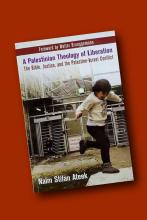
SOME YEARS AGO, I convened a trip to the so-called Holy Land. It was not a trip about “walking where Jesus walked,” although we did a lot of that. It was a trip to discover facts on the ground in the Israel-Palestine conflict and to meet Jewish, Muslim, and Christian peacemakers in the region. Our band of 20 or so was led by organizers Jeff and Janet Wright, passionate Christians who love the land and all its people.
Nearly everyone on the trip had a breakdown moment, when the tragedy of Israel-Palestine overwhelmed them. My wife, Grace, described a sudden feeling that she had spent her whole life in a totalitarian regime and that “what I thought of as news had really been propaganda all along.” The reality of Israel-Palestine was so different from what she had heard both in the Christian community and in the mass media that she was deeply shaken. We all felt that our trip had exposed so much of the so-called news we had heard from Israel-Palestine as prejudiced, one-sided, and intended to conceal more than reveal.
A trip highlight was a visit to the offices of Sabeel, the headquarters of Palestinian liberation theology, and a meeting with its founder Naim Ateek, a theological hero I’d admired from afar. What Desmond Tutu is to South African theology and Martin Luther King Jr. and James Cone are to North American black theology, Ateek is to Palestinian and Middle Eastern theology. I have since been honored to be an ally in the important work of Sabeel.
Ateek has written a definitive introduction to his work. A Palestinian Theology of Liberation will be especially helpful to three groups of people in the U.S.
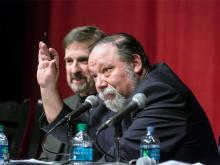
For Catholics, the key to working collaboratively with Pope Francis, on issues from mass migration to climate change to Hispanic evangelization, may be found in a controversial movement that many left for dead long ago: liberation theology.
That message reverberated, from Feb. 6 to Feb. 10, through the halls of Boston College and a nearby retreat center, as nearly 40 theologians gathered from across the Spanish-speaking world to discuss the movement’s future with its founding figures.
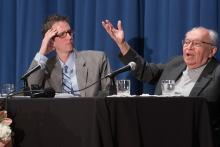
Reagan and John Paul helped spell doom for the Soviet empire, and the pontiff waged a decades-long campaign inside the church — helped by his doctrinal chief, Cardinal Joseph Ratzinger, who would later become Pope Benedict XVI — to quash liberation theology and silence its most ardent supporters.
Today, however, it’s a wholly different story — and to listen to the Rev. Gustavo Gutierrez, the Dominican priest from Peru who is known as the father of liberation theology, one might wonder what all the fuss was about.
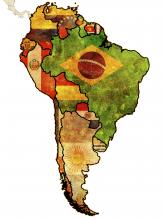
JON SOBRINO LAUGHS ever so slightly at my question. His office in the Monseñor Romero Center in San Salvador is a paper cavern, a place where a theological archeologist digging to understand the highs and the lows of liberation movements within the church would find a mother lode of artifacts.
Where is liberation theology going from here under Pope Francis? Sobrino, perhaps one of the most prolific liberation theologians, is thin and thoughtful. He considers his words: Liberation theology is a way of thinking about how a Christian must live—in active, engaged struggle for the flourishing of all life. Liberation is the primary movement of the Holy Spirit. It is the duty of those baptized into the life, death, and ministry of Jesus Christ to live this out, immediately and urgently.
In March 2013, when Argentine Cardinal Jorge Mario Bergoglio, Sobrino’s fellow Jesuit, became pope, liberation theologians and practitioners took a deep collective breath—what would happen next?
IN THE LARGEST currency change that the world has ever seen, the euro was launched on New Year’s Day 2002 with great excitement and ceremony in 12 eurozone member countries. At the time, the shared currency was considered to be a vehicle for tying together separate states and cultures with numerous economic benefits, particularly to trade, employment, and tourism.
Now imagine a humble, 90-year-old Catholic priest, vibrant yet shrunken and bent with age. In Italian, he addresses a group about the euro in the celebratory year of its launch. In one hand he holds up an unconsecrated host; in the other, a one-euro coin. They are the same shape, and nearly the same size. But the coin is shiny silver and gold. The priest speaks simply and directly about how, despite their similar appearance and promise of life enrichment, the euro is deceptive. The dominance of finance and capitalism that it supports is a false idol, he says, which leads to addiction.
This story was recounted by a number of Italian press outlets at the time. It contributes to the mythos of this man who writes extensively about the Eucharist, which he believes, in contrast to the euro, creates a relationship not just with God but with our fellow human beings.
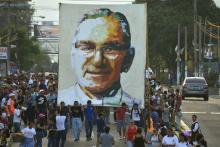
Pope Francis on Feb. 3 officially declared that Archbishop Oscar Romero, assassinated by a right-wing death squad in 1980 while celebrating Mass in El Salvador, was a martyr for the faith, clearing the way for his beatification.
The move ends decades of fierce debate over Romero’s legacy, but it was not a complete surprise: Francis, the first Latin American pope, has often said he thought Romero was a martyr worthy of consideration for sainthood.
But his view contrasts with the conservative papacies of John Paul II and Benedict XVI, which viewed Romero as an icon of the theological left who was killed for political reasons because he spoke out against poverty and human rights abuses.
As a result, Romero’s cause for canonization languished in the Vatican’s bureaucratic limbo despite his great popularity elsewhere.
That is set to change. the Feb. 3 declaration by Francis stated that Romero was “killed in hatred of the faith.” On Feb. 4, the Vatican is scheduled to hold a news conference with Archbishop Vincenzo Paglia, a Vatican official who is promoting Romero’s cause for canonization.
AS I ATTENDED seminary in my native Chicago, I heard about one senseless death after another. A six-month-old baby shot multiple times with an assault weapon; a young black girl, with promise and a future, caught in the crossfire—all casualties of gang violence.
This violence is further evidence to me that our theology is needed on the streets. A theology that can impact the crisis facing the black community must be relevant to the black community. Theology can never be disengaged from the history of black people, the “isms” that have oppressed us, and the struggles that have birthed our progress. “Relevancy,” for theology, means moving beyond the academy and the church and into the streets, where it becomes our thinking faith in action.
Does our theology have anything to say to African-American gang girls? The formation of girl gangs is rooted in the numerous social ills affecting many urban African-American communities. By taking our theology to the streets, we can offer African-American gang girls an alternative hope and future. Four theological frameworks can aid in that task.
First, a practical theology—thinking faith in action—that models Jesus’ ministry to the marginalized can reach these girls with the message of God’s compassion, peace, and hope by offering a positive relational sisterhood that can replace gang life.

TWO OF MY greatest teachers were Latin American men, both ordained as Catholic priests. One, Archbishop Oscar Romero, was assassinated in 1980. I never met him, being a 20-year-old American who’d never set foot in El Salvador or anywhere else in Latin America. But Romero made me, a lapsed Catholic, wonder why his views—our views, if Christian social teaching means anything at all—would be viewed with murderous hostility by the Salvadoran elite. After all, it was all right there in the Book. Wasn’t it?
The truth was, I didn’t know. Was it worth looking at books about these matters? That’s what we believed in medical school: Look it up! So Romero led me to the second of these teachers who, I’m happy to say, is alive and well and living (mostly) in Lima, Peru. Gustavo Gutiérrez, a diminutive and humble Dominican priest and a great friend of Romero’s, taught me through his books, from The Power of the Poor in History toWe Drink from our Own Wells, and later through his friendship and his almost mystical (to me, in any case) optimism.
Over the course of my 20s, the slender, frayed thread of my own faith, which I had believed cut, slowly came back into view. There was a filament a bit stronger than imagined, made visible in part by my Haitian hosts and patients and friends, and in part by Catholic social activists working against poverty in settings as different as tough neighborhoods in Boston, the farms of North Carolina, and the slums of Lima.
Some were nuns or priests, some were engaged laity, from many professions. Most were people living in and struggling against their own and others’ poverty. Their activism taught me a lot about a space in the Catholic Church I’d not seen clearly before, and about the promise of long-term engagement in the monumental struggle against poverty and discrimination in all its forms. That includes gender inequality, no stranger to the institution. Most of the most inspiring activists were women.
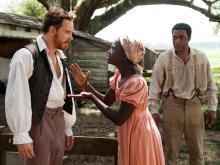
Crickets chirping, a branch creaks, and a black body swings on a tree whose roots grow deep into a shared story of our American past. These are images that are floating in my mind, after watching a pre-screening of12 Years a Slave. This film was a terribly beautiful depiction of the antebellum south and the atrocity known as slavery. Its honesty was riveting, as the film portrays characters in ways never captured before on the big screen. They were characters such as Mistress Shaw (played by Alfre Woodard), the black wife of a slave master who is adored by her husband and treated as a white woman. In a panel discussion, Lisa Sharon Harper of Sojourners asked Woodard, about this character. And she responded that in the South, there were all kinds of arrangements between whites and blacks. Her character Mistress Shaw learned how to survive. I was so refreshed that 12 Years a Slave, was a new depiction of slavery instead of a rehashing of Roots orAmistad.
The panel also consisted of a plethora well-informed faith leaders. One of the panelists, Jim Wallis, while discussing the aspects of faith profoundly said, “Enslaved Africans saved Christ from the Christians.” I was immediately struck by his words as they reminded me of how I became a Christian.
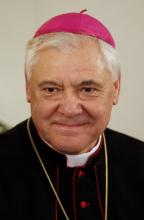
A progressive theological current that emphasizes the Catholic Church’s closeness to the poor and the marginalized but was subject to decades of hostility and censure is now finding increasing favor in the Vatican under Pope Francis.
Francis, who has called for “a poor church for the poor,” will meet in the next few days with the Rev. Gustavo Gutierrez, a Peruvian theologian and scholar who is considered the founder of liberation theology.
The meeting was announced on Sunday, Sept. 8, by Archbishop Gerhard Ludwig Mueller, prefect of the Congregation for the Doctrine of the Faith, the Vatican’s doctrinal watchdog, during the launch of a book he co-authored with Gutierrez.
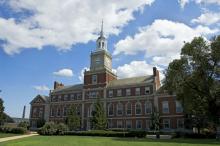
For many pundits and observers, last week’s election proved that a “new normal” has emerged in America: record numbers of women and ethnic minorities were voted into the House and the Senate, and the House will also see its first Hindu representative in January. Voters in Maine and Maryland approved same-sex marriage, and a diverse coalition of social minorities came together to re-elect the nation's first black president.
But for black theologians, the election has also been an occasion to reflect on how the black church faces an identity crisis, losing track of its mission to lead the way in issues of justice and liberation.
“Something happened to the black church after the assassination of Martin Luther King, Jr., in 1968,” said Dr. Gayraud Wilmore, one of the founders of black theology, adding that when King died, it seemed that in black congregations, the enthusiasm for black history and racial identity also died.
And for Wilmore, the last 44 years — even the election and re-election of a black president — have done little to abate this crisis.
Ada María Isasi-Díaz often quipped that she “was born a feminist on Thanksgiving weekend in 1975,” when she attended the first Women’s Ordination Conference in Detroit. At the time of her unexpected death in May at age 69, after fighting an aggressive cancer, she was acknowledged as the full-fledged mother of mujerista theology and recognized around the world for her critical contribution in shaping a feminist liberation theology for Latinas in the United States.
Ada was “a pioneer,” Catholic theologian Rosemary Radford Ruether told Sojourners. “She gave us a vision of justice and integrity for Latina women in the U.S. and the world that was inspiring”; her work is “an integral part of feminist theological thought.”
Ada María Isasi-Díaz was born in Cuba in 1943, the third of six sisters and two brothers. Her father worked in the sugar cane mills, and her mother nourished in Ada a love of Catholic religious practices and the importance of staying in the struggle (la lucha) for what one believes. Her family fled Cuba after years of civil war, and in 1960, at age 17, Ada arrived in the U.S. as a political refugee. Soon she joined the Ursuline sisters and, in 1967, was sent to Lima, Peru, as a missionary.
“I lived there for three years,” Ada wrote. “This experience marked me for life ... It was there that the poor taught me the gospel message of justice. It was there that I learned to respect and admire the religious understandings and practices of the poor and the oppressed and the importance of their everyday struggles, of lo cotidiano.”
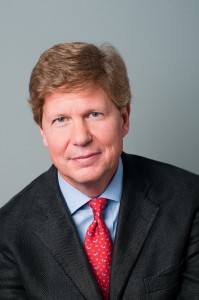 The puzzle here is not that readers of the Bible would tilt toward the political left. That, for me, as well as for thousands of other American evangelicals, is self-evident. Jesus, after all, summoned his followers to be peacemakers, to turn the other cheek, to welcome the stranger and to care for “the least of these.” He also expressed concern for the tiniest sparrow, a sentiment that should find some resonance in our environmental policies.
The puzzle here is not that readers of the Bible would tilt toward the political left. That, for me, as well as for thousands of other American evangelicals, is self-evident. Jesus, after all, summoned his followers to be peacemakers, to turn the other cheek, to welcome the stranger and to care for “the least of these.” He also expressed concern for the tiniest sparrow, a sentiment that should find some resonance in our environmental policies.
No, the real conundrum lies in the subtitle the editors of Christianity Today assigned to Franzen’s article, which was titled, “A Left-Leaning Text.” Adjacent to a picture of a Bible tilted about 45 degrees to the left, the editors added the subtitle: “Survey Surprise: Frequent Bible reading can turn you liberal (in some ways).”
The fact that anyone should register surprise that the Bible points toward the left should be the biggest surprise of all.
Over the past few weeks various news outlets have run stories on the so-called feminism of Sarah Palin and Michele Bachmann. Typical of the media, in order to make that claim, they, of course, had to assume that any woman doing anything in public equals some sort of feminist revolution. It is, however, a rapidly spreading idea. If the concept of successful women must be blamed on feminist action, then successful conservative women must be the result of feminism as well. Granted this new definition of "feminist" is, as Lisa Miller wrote for the Washington Post, "a fiscally conservative, pro-life butt-kicker in public, a cooperative helpmate at home, and a Christian wife and mother, above all." But apparently it's still feminism.
While many from the left were outraged by the idea of associating these arch-conservatives, who stand against many of the things historical feminists have supported, with feminism, others supported the idea. Naomi Wolf, who seems to have a love/hate relationship with feminism, wrote that the problem some have with calling those women feminists is that we don't understand the history of feminism. She argues (rightly in my opinion) that feminism has only become associated with leftist agendas since the 1960's, but was, in its origins, more balanced and open to conservative values. But then she explains her reasoning why: